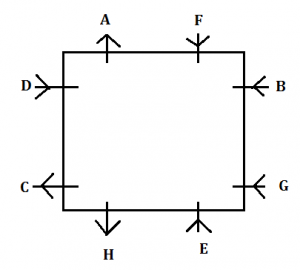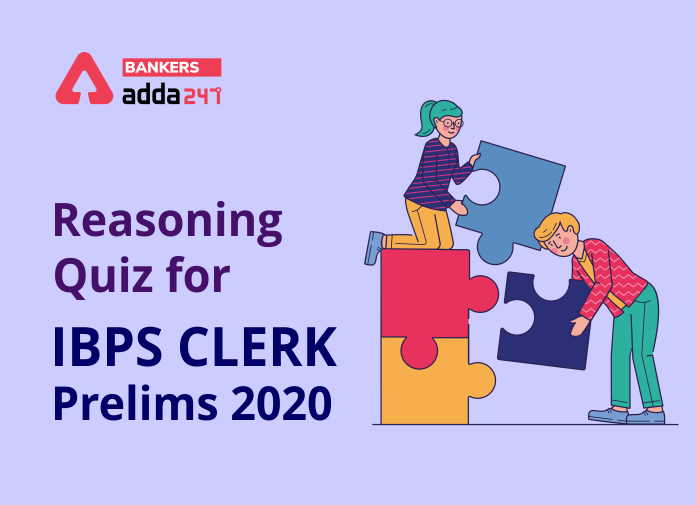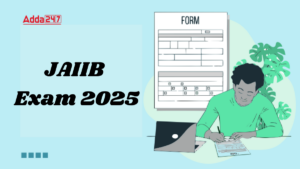Table of Contents
Directions (1-5): Study the following information carefully to answer the given questions.
A B, C, D, E F, G and H are sitting around a Square table such that two persons sit on each side, but not necessarily in the same order. Some of the people are facing the centre while some face outside. C sits second to the left of E. E faces the centre. F sits third to the right of C. G sits second to the left of H. G faces the same direction as D. Immediate neighbours of E and F face opposite directions (i.e., if one neighbour faces the centre the other neighbour faces outside and vice-versa). H doesn’t face towards the center. G sits opposite to C. D sits third to the right of B. E sits second to the left of B. Immediate neighbours of B face the same direction (i.e., if one neighbour faces the centre the other neighbour also faces the centre and vice-versa)
Q1. How many people are sitting between G and C when counted in clockwise direction from G?
(a) Two
(b) Three
(c) One
(d) Four
(e) Five
Q2. Which of the following is TRUE regarding E as per the given seating arrangement?
(a) H sits second to the left of E
(b) E faces inside
(c) Only two people sit between E and F when counted in clockwise direction from E
(d) C is one of the immediate neighbors of E
(e) Only three people sit between E and G
Q3. Four of the following five are alike in a certain way based on the given seating arrangement and so form a group. Which is the one that does not belong to that group?
(a) C
(b) A
(c) H
(d) D
(e) None of these
Q4. What is B’s position with respect to A?
(a)Third to the left
(b)To the immediate left
(c)To the immediate right
(d)Second to the right
(e)Third to the right
Q5. Who sits second to the left of D?
(a) H
(b) A
(c) B
(d) Other than those given as options
(e) F
Directions (6-10): The following questions are based on the five three digits numbers given below:
135 241 569 748 873
Q6. If in each number, all the three digits are arranged in ascending order within the number, which of the following will be the second lowest number after rearrangement?
(a) 873
(b) 748
(c) None of these
(d) 569
(e) 135
Q7. If second digit will be interchanged with third digit in each number, then which number will be the second highest number after rearrangement?
(a) 873
(b) 748
(c) None of these
(d) 569
(e) 135
Q8. If in each number, both first and third digits are added and after that second digit is subtracted from that addition then how many numbers are greater than 5 after mentioned operation?
(a) One
(b) Two
(c) Three
(d) Four
(e) None of these
Q9. If in each number, all the odd digit is subtracted by 1 and all even digit is added by 1 then, which of the following will be the lowest number after mentioned operation?
(a) 873
(b) 748
(c) None of these
(d) 569
(e) 135
Q10. If 1 is subtracted from first digit and 2 is added in last digit of each number then which number will be the 4th lowest number after mentioned operation?
(a) 873
(b) 748
(c) None of these
(d) 569
(e) 135
Directions (11-15): In these questions, relationship between different elements is shown in the statements. These statements are followed by two conclusions.
Mark answer as
(a) If only conclusion I follows.
(b) If only conclusion II follows.
(c) If either conclusion I or II follows.
(d) If neither conclusion I nor II follows.
(e) If both conclusions I and II follow.
Q11. Statements: A≤M>G >K >D, M≤O< S, K<H
Conclusions:
I. G < S
II. A > D
Q12. Statements: B ≥ E >L<O>R=U
Conclusions:
I. B<L
II. U=L
Q13. Statements: X ≥ Q > F, A > F, R = M ≥ F
Conclusions:
I. R > A
II. X > F
Q14. Statements: D ≤ G > K ≥ R > T, G ≤ E > W, R < Y
Conclusions:
I. W ≥ D
II. Y > T
Q15. Statements: B ≥ K > G, M ≤ G, D = W ≥ G
Conclusions:
I. D ≥ M
II. K < W
Practice More Questions of Reasoning for Competitive Exams:
Solutions
Solutions (1-5):
Sol. 
S1. Ans. (a)
S2. Ans. (b)
S3. Ans. (d)
S4. Ans. (d)
S5. Ans. (e)
Solutions (6-10):
S6. Ans.(e)
Sol. 135, 124, 569, 478, 378
S7. Ans.(b)
Sol. 153 214 596 784 837
S8. Ans.(b)
S9. Ans.(e)
S10. Ans.(b)
Solutions (11-15):
S11. Ans.(a)
Sol. I. G < S (true) II. A > D (false)
S12. Ans.(d)
Sol. I. B<L (false) II. U=L (false)
S13. Ans.(b)
Sol. I. R > A (false) II. X > F (true)
S14. Ans.(b)
Sol. I. W ≥ D (false) II. Y > T (true)
S15. Ans.(a)
Sol. I. D ≥ M (true) II. K < W (false)
Download PDF of this Reasoning Quiz for IBPS Clerk 2020
Practice with Crash Course and Online Test Series for IBPS Clerk Prelims:
- Bank Test Pack Online Test Series (12 Months)
- IBPS Clerk Prime Online Test Series 2020 by Adda247
- IBPS Clerk 2020 Online Coaching for Clerk Prelims | Complete Bilingual Batch by Adda247




 GA Capsule for SBI Clerk Mains 2025, Dow...
GA Capsule for SBI Clerk Mains 2025, Dow...
 The Hindu Review October 2022: Download ...
The Hindu Review October 2022: Download ...
 JAIIB Exam 2025, Registration, Exam Date...
JAIIB Exam 2025, Registration, Exam Date...




